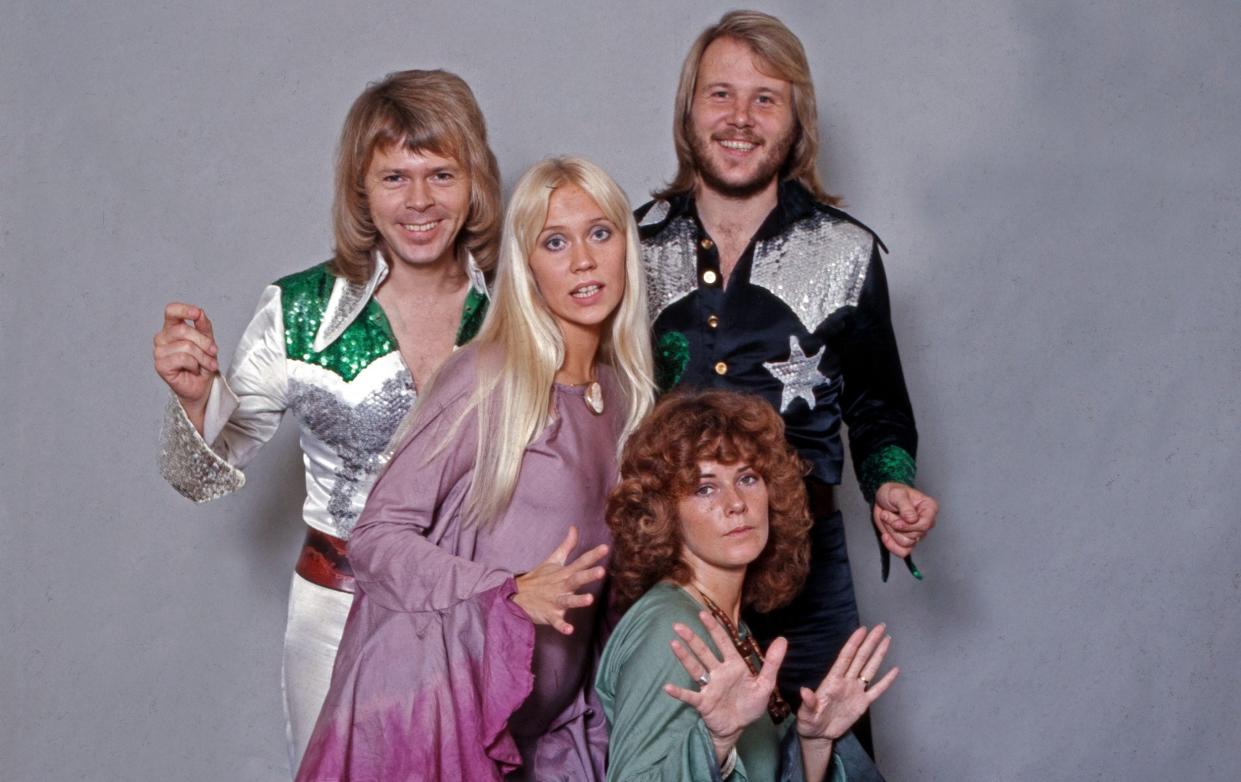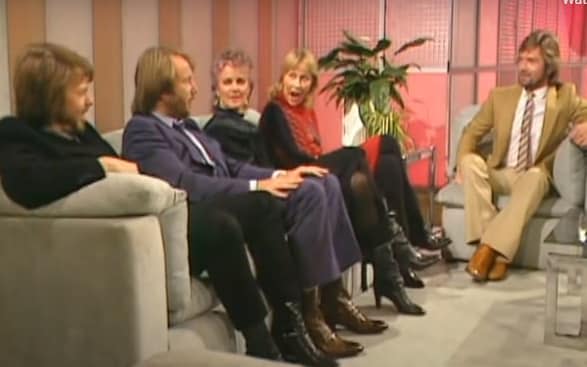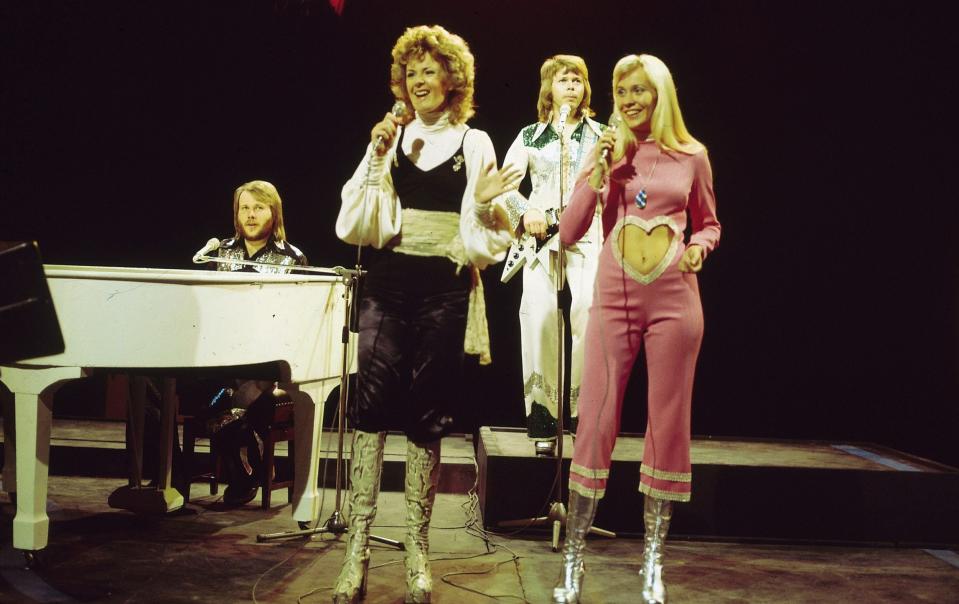How ABBA’s heart of darkness had all their critics fooled

If you’re looking for a clue as to just how cheap ABBA could be in everything but their music, the video for the song Fernando is a good a place to start. The clip begins with an image of a blood red sun. Unwilling to spend money in the service of a single that would go on to sell 10 million copies, the band’s manager, the famously frugal Stig Anderson, demanded that the shot be of a picture of a sunset taken from the pages of a magazine.
I can think of no other band whose presentational shoddiness contrasts so sharply with the exquisite brilliance of their music. ABBA could be guaranteed to grace every photo shoot looking as if they’d dressed themselves in the dark. Music videos were thrown together with all the care of a teenager reviewing fried chicken outlets on a YouTube channel. The group’s final TV interview, in 1982, was with Noel Edmunds on the grindingly naff BBC light entertainment programme The Late, Late Breakfast show.
Attention was also devoted to the physical aspect of singer Agnetha Faltskog. “I’m not just a sexy bottom, you know,” she told Edmunds in what was by then an enduring rebuttal. Five years earlier, in ABBA: The Movie – a film that makes Spice World look like Cabaret – could be seen perusing the reviews from a recent concert in Sydney written by men apparently obsessed with her derriere. “Don’t they have bottoms in Australia?” she asked.
The quartet’s enduring sense of aesthetic anarchy in an age of front-foot sexism surely explains why, for much of the Seventies and early Eighties, so many people tended to undervalue their music. They just weren’t as cool as the guys with the guitars or the punks with the attitude. They were, as more than one reviewer said, ‘disposable’.
Well, hardly. As you will doubtless have heard, yesterday the group announced that November will see the release of Voyage, their first studio album since The Visitors in 1981. Less encouragingly, next May Agnetha Faltskog, Anni-Frid Lyngstad, Benny Andersson and Bjorn Ulvaeus will appear in motion-capture form during a four month run of concerts at a purpose built arena at London’s Queen Elizabeth Park (the show’s visual aspect will be overseen by the special effects firm Industrial Light & Magic).
Two tracks from Voyage have already met their waiting public. Released yesterday, I Still Have Faith In You, the album’s opening track, is the kind of airborne-in-first-class monster ballad that graduated from the same school as Chiquitita. The less impressive Don’t Shut Me Down is an ostensibly jaunty track, but the news in the first verse that “the sun is going down, it’s getting dark” suggests that, as ever, the group’s world is a place in which things are not always as they sound.
As the front pages of today’s newspapers will attest, this is headline news. It’s like Led Zeppelin unveiling their first album since In Through The Outdoor, or Pink Floyd, reunited with Roger Waters, bouncing back with their first piece of vinyl since The Final Cut. Don’t get me wrong, I’m not saying that ABBA are the equal of these groups. What I’m saying is, when it comes to the exalted consistency of their body of work, they’re even better.
In fact, ABBA’s magic dust is so potent that even the faintest sprinkle can make other people’s songs iconic. The blockbusting hit single Oliver’s Army, by Elvis Costello & The Attractions, was destined to be a b-side until keyboardist Steve Nieve re-purposed the piano trill from Dancing Queen into its arrangement. Glenn Matlock lifted the riff from SOS for use in the Sex Pistols’ Pretty Vacant. You read that correctly. “All I did was take that pattern and alter it slightly,” he said.
Back then, music critics were tripping over themselves throwing encomiums at artists such as Costello and the Pistols, not to mention any number of blokey also-rans whose names are now forgotten. When it came to ABBA, the praise was far more grudging. Yesterday I spent an entire morning digging through old reviews of the band, their albums and their concerts. I couldn’t find a single one that wasn’t, at best, full of backhanded compliments.

“Anni-Frid and Agnetha may only just sing adequately but they look just fine… it’s fodder for the masses in the least derogatory sense,” wrote Tim Lott, in 1976. “After a while the clinical aspect of the construction of an ABBA song becomes increasingly annoying,” was the opinion of Harry Doherty from the Melody Maker. Reflecting on the group’s original career, Chris Charlesworth wrote how “like most of my rock writer colleagues I regarded them somewhat disdainfully, deeming them perpetrators of lightweight commercial pop.”
Really, writing about ABBA’s finest tracks ought to have been the easiest job in the world. As applied to songs such as The Name Of The Game, Like An Angel Passing Through My Room, The Winner Takes It All, Eagle, Andante, Andante and dozens of others, reviewers were required to say nothing more than, “This music is perfect. It cannot be improved in any way.” It should have been the easiest 50 quid they ever earned.
Instead, we got this, from the writer Glenn A. Baker. “A lot of adult people working in the music industry really had a great admiration for the group,” he said. “But it was very difficult to express it, because their fan base appeared to be about eight years old. No adult with any sort of pretensions to cool was ever going to bat for a group whose fan base was in fact children.”
I don’t know about you, but I’m not sure I’ve heard of kids’ entertainers singing songs about oppressed Cold War dissidents (Soldiers), a ménage a trois involving a mother and her daughter (Two For the Price of One), or underage girls seeking sex backstage at rock concerts (Does Your Mother Know). I’m not sure it’s ABBA’s fault that people failed to see past the shiny wrapping and into the darkness.

I have no doubt that the constant drizzle of critical derision was at least in part informed by the fact that journalists were powerless in the face of the quartet’s appeal. Even in the United States, their weakest territory, albums regularly went gold. In an astonishing run of success in the UK, ABBA scored six number one hits over the course of seven releases (the other, Money, Money, Money went to number three). Such was the group’s profitability that in 2000 they were able to turn down an offer to tour worth a billion dollars.
Come the end of their reign, ABBA were releasing music of unnerving chilliness. The last two singles issued when the group were still together – the deeply ominous The Day Before You Came and Under Attack – both failed to crack the UK top 20. As the members went their separate ways, the notion that they would one day become the most historic reunion in the history of popular music was for the birds.
But the songs refused to die. In 1992, Kurt Cobain insisted that the Australian ABBA tribute group Bjorn Again appear on the bill at the Reading Festival headlined by his band Nirvana. (I happened to be there; the sight of 40,000 alternative rock fans grooving to Take A Chance On Me was a thing to behold.) That same year Erasure scored a top 10 hit in 14 countries (including a number one in the UK) with their five-track EP of cover versions, ABBA-esque. The jukebox musical Mamma Mia! opened in 1999 and has yet to close. You know the rest.
For all it’s worth, I am delighted that ABBA have decided to risk their reputation by releasing an album of new material. I’m thrilled that they’re willing to drag their legacy into the present tense. For 40 years I’ve believed that I’d never hear their kind again. In November, we will.
